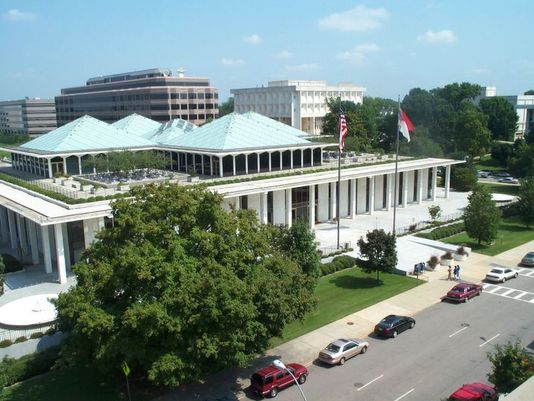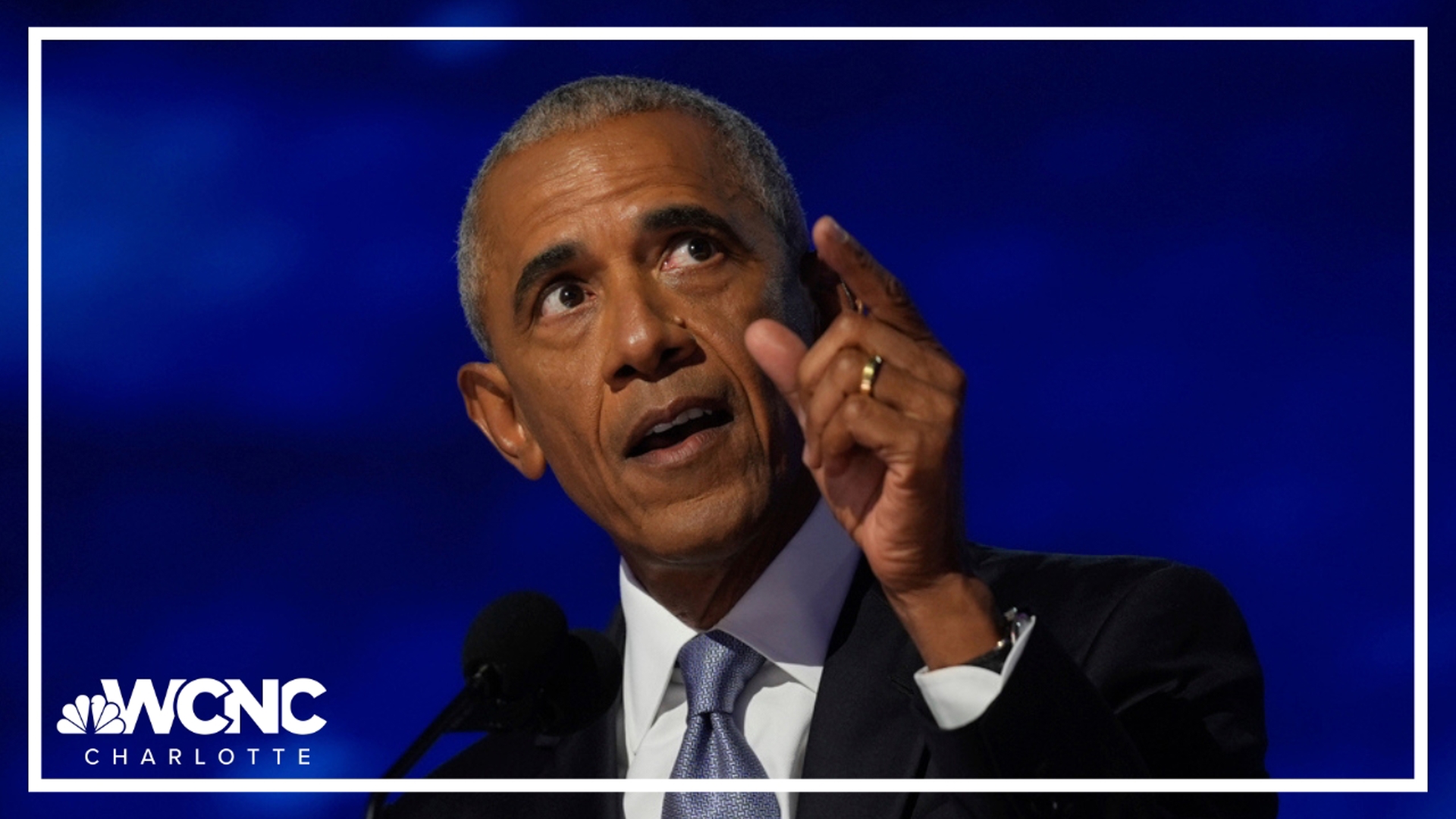Senate majority leader Phil Berger and House Speaker Tim Moore just finished a press conference Monday afternoon outlining key provisions of the House-Senate state budget compromise to be voted on later this week. Here are key points they shared with reporters:
--$21.735 billion in total spending, a 3.1 percent increase.
--The state income tax rate will fall to 5.5 percent beginning in 2017, down from the current 5.75 percent.
--The sales tax will be extended to cover some services, but just which is still unclear. Berger said that if an item is taxed when it is sold, installing it will also involve a sales tax. There will be no sales tax on advertising or veterinarian services. The idea is not to make any business not now collecting the tax have to start, Berger said.
"The benefit to that is you don't create any additional retailers," Moore said.
--Fees charged by the state Division of Motor Vehicles will rise.
--A $2 billion bond package has been agreed to but Moore says there is still work to be done to identify projects the money will be spent on.
--There will be no shifting of sales tax revenue among counties and municipalities as the Senate had proposed earlier.
--Most state employees and teachers will get a $750 bonus. Beginning teacher pay goes from $33,000 to $35,000.
--Money for teacher assistants and drivers education stays intact. School systems will be required to spend money designated for teacher assistants on assistants, ending flexibility for that line item local schools have had before.
--Berger said the sales tax money will provide help to some counties for school funding but that the mechanism is too complicated to describe at Monday's press conference. "This will cost no county any money," Moore said.
--The state's historic preservation tax credit will be extended, but apparently at a reduced level expected to cost around $8 million.
--Tax credits for renewable energy projects like solar farms will not be extended after their scheduled Dec. 31 sunset, although a law passed earlier in the session to allow the credits for certain projects already in process remains.
--Bills on Medicaid restructuring, economic development incentives and bonds have been agreed to at least in principle and will start moving through the General Assembly this week and next. It may be next week before clear both chambers, Moore said.
--There will be increased funding for courts and additional pay for state troopers and correction workers.
--The text of the budget won't be available until later Monday, possibly Monday evening. It's expected to be about 500 pages long.
--Berger said the Senate expects to take its first budget vote on Tuesday. He said that's enough time for senators to review it because there's little in the compromise that hasn't already been in the House or Senate budget.
"The provisions that are in there have been much debated, much discussed," he said. "There is nothing in there anybody would be surprised about."
House votes are expected Thursday and Friday. A stopgap budget to keep state government running expires at the end of Friday, meaning Gov. Pat McCrory will have to make a decision this week on whether to sign the budget.
--A Department of Military and Veteran Affairs will be created.
--State parks will be moved from the Department of Environment and Natural Resources to the Department of Cultural Resources.
--No repeal of the state certificate of need law, which gives state regulators veto power over expansion or establishment of some major medical facilities.
--No changes in taxation on nonprofits. The Senate had proposed making the largest pay sales tax.
--Berger and Moore said it took so long to arrive at a budget -- the state fiscal year began July 1 -- because it addresses issues that had been put off before.
"We recognize that we have been here for a while because we've dealt with a lot of chronic problems," Moore said.
--Both said the budget is a compromise and predicted it will have strong support in the House and Senate.
"This is something that is not perfect as far as the Senate is concerned. This is something that is not perfect as far as the House is concerned," Berger said.
Following is the text of a press release staffers sent later Monday afternoon on behalf of Berger and Moore:
House, Senate Budget Agreement Strengthens Public Education, Cuts Taxes, Funds Core Government Functions
Raleigh, N.C. – House Speaker Tim Moore (R-Cleveland) and Senate Leader Phil Berger (R-Rockingham) held a joint press conference Monday to announce details of the $21.735 billion budget agreement reached by members of the House and Senate this past weekend.
The compromise plan includes a responsible 3.1 percent spending increase, invests hundreds of millions of additional dollars in public education and other core priorities and shores up the state's rainy day and repair and renovation funds by $600 million.
The plan increases early-career teacher pay to from $33,000 to $35,000 per year, fulfilling a promise made by state leaders last year. And over two years it preserves funding for driver education and for all teacher assistant positions supported in last year's budget, requiring school systems to use the funds for those jobs.
The budget also invests an additional $705 million over two years for transportation needs, in part by ending a $216 million transfer from the Highway Fund to the General Fund and ensuring that money is finally spent on building and maintaining safe roads and bridges.
Finally, it contains a comprehensive tax reform package that reduces the tax burden on North Carolina families and small businesses by close to $400 million over the next two years and fully restores the state tax deduction for medical expenses. The plan also extends Historic Preservation Tax Credits.
"I am grateful to members of the Senate and House for their hard work in reaching a final budget agreement that is fiscally smart, sustainable and saves for the future – while still investing hundreds of millions of dollars for real needs in public education, public safety and transportation," said Berger.
"Throughout this process, the House has remained firm on its priorities to reward our teachers and State personnel, preserve Driver Education, continue to employ valuable Teaching Assistants, find innovative ways to improve our education standards and to invest in North Carolina to strengthen our future. We can never afford to stop looking for ways to improve our State," stated Speaker Moore. "I am pleased that we have produced a responsible budget agreement that invests in North Carolina's present and future, while it also puts more money back into taxpayers' wallets. I commend the Budget Chairs and Conferees of both the House and Senate for their tireless efforts."
Additional key provisions of the budget compromise include:
In Salaries and Benefits –
Allocates $313 million in the first year alone for compensation increases to state employees, including a $750 bonus for all teachers and state workers.
Offers experienced-based step increases to teachers, assistant principals, principals, State Highway Patrol troopers, clerks and magistrates.
Sets aside funding for pay raises to community college employees.
Allocates funds for a 3 percent market-based salary increase for all sworn members of the State Highway Patrol and raises starting salaries from $35,000 to $36,050 per year.
Funds Gov. McCrory's recommendation to invest more than $38 million over two years to boost salaries for correctional officers.
Funds Gov. McCrory's plan to provide additional targeted, market-based pay raises to attract and retain highly effective workers.
In Education –
Increases funding for public education by more than $530 million in the first year alone.
Reduces class size in first grade to a 1:16 teacher-student ratio in the second year – a step research has repeatedly shown is key to academic success.
Enhances textbook and digital learning resources funding to ensure that students across the state receive the tools they need to succeed.
Expands the Read to Achieve summer reading camps in to first and second grades.
Increases support for the opportunity scholarship program by $14 million over two years to award more need-based scholarships to children from working families.
Provides for comprehensive data collection and study of driver education to improve the program and help ensure better student outcomes.
Fully funds teacher assistant positions at the 2014-2015 level and includes language to protect those jobs.
Allocates funding to the School Connectivity Initiative to bring better broadband and WiFi access to all North Carolina schools.
In Taxes and Economic Development –
Cuts the personal income tax rate to 5.499 percent beginning in 2017.
Increases the zero percent tax bracket in 2016 – ensuring taxpayers married filing jointly pay no state personal income tax on their first $15,500 of income.
Encourages job creation and private investment in North Carolina by moving to calculate corporate income tax on the basis of a single sales factor over the next three years.
Provides new local tax revenue to support education and economic development in counties with insufficient local sales tax dollars. The additional local revenue must be used to support public schools, community colleges or economic development in those counties.
Maintains the existing system for allocation of local sales tax revenue, where 75 percent is allocated based on the county where a sale takes place and 25 percent is based on population – ensuring no local government will lose revenue under the changes.
Elsewhere –
Provides $225 million over two years to begin the process of restructuring and reforming the state's chronically troubled Medicaid program.
Increases funding for essential court system needs – like interpreters, expert witnesses and juror fees – and operations at the Administrative Office of the Courts.
Lays the groundwork to give voters the opportunity to pass a $2 billion bond referendum to support improvements across state government.
Adjusts fees at the Division of Motor Vehicles for the first time in more than a decade to support additional transportation needs. The change in fees will be more than offset by the major tax cuts also found in the budget.
Adopts the governor's proposal to create the Department of Information Technology, which is expected to save $30 million over the biennium by reducing duplicative spending and increasing consolidation.
Implements the governor's recommendation to establish a more efficient state Department of Military and Veterans Affairs and provides close to $1.7 million to support military installations.
The full budget compromise bill will be posted to the North Carolina General Assembly website at www.ncleg.net on Monday evening.


